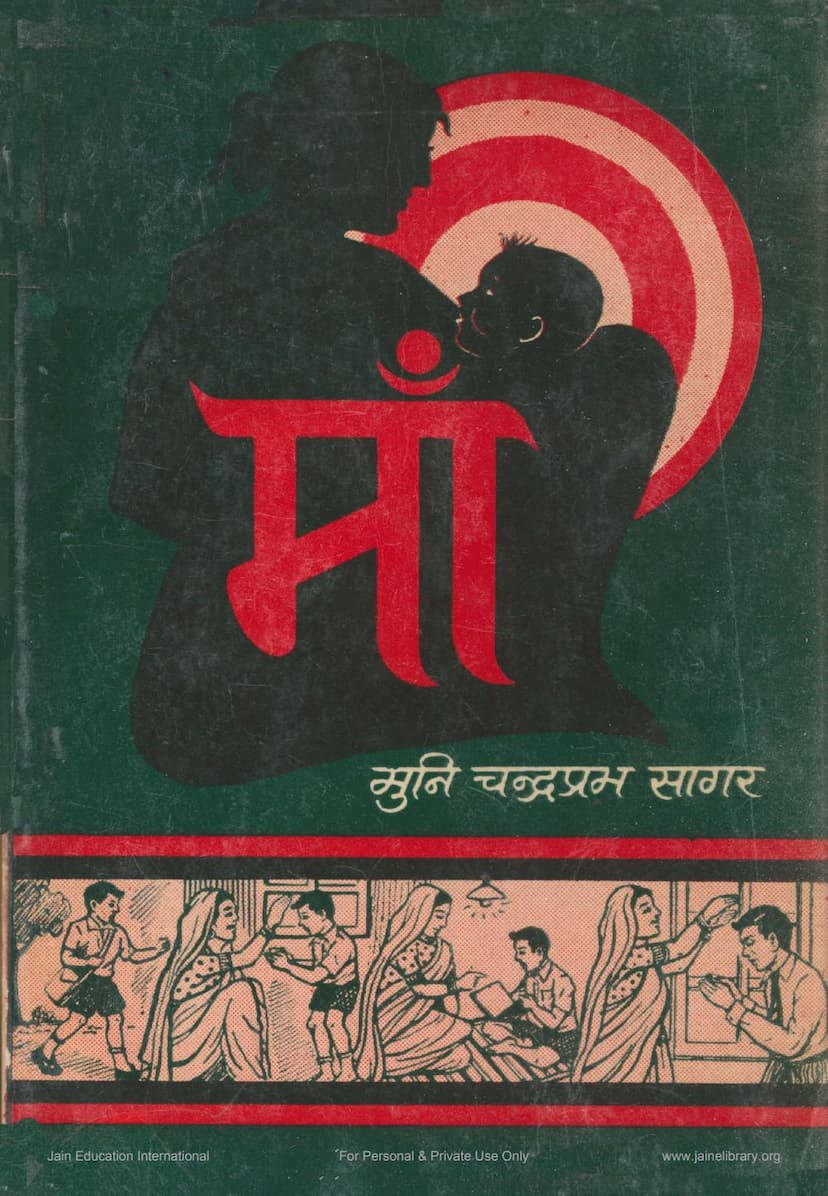Maa
Added to library: September 2, 2025

Summary
This Jain text, titled "Maa" (Mother) by Muni Chandraprabh Sagar, is a profound exploration of the concept of motherhood, its significance, and the virtues associated with it, deeply rooted in Jain philosophy and Indian cultural ethos. Published in November 1982, it is a 132-page book dedicated to the author's mother and supported by various patrons.
Here's a comprehensive summary of the key themes and content presented in the text:
Central Theme: The Omnipresence and Significance of "Maa" (Mother)
The book consistently elevates the mother figure to the highest pedestal, portraying her not just as a biological parent but as a divine entity, the foundation of the universe, and the embodiment of all virtues. The author argues that a mother's love is unparalleled and forms the bedrock of human existence, morality, and societal progress.
Key Concepts and Arguments:
- Maa as the Source of Existence and Divinity: The text asserts that all creation, from the smallest particle to the grandest concept, originates from the maternal power. The mother is equated with Earth (Dharti), Nature (Prakriti), and a divine force. The book draws parallels between the mother and the divine, suggesting that true devotion and understanding of the divine are often found through the reverence of one's mother.
- Unconditional and Unrivaled Love: Mother's love is described as pure, selfless, and boundless, surpassing all other forms of love in the universe. It is characterized by compassion, sacrifice, and an unending wellspring of affection that nurtures and shapes an individual.
- Mother as the Embodiment of Virtues: The book meticulously details the virtues inherent in a mother, including forgiveness, patience, strength, sacrifice, and unwavering devotion. Through numerous anecdotes and references, it illustrates how mothers embody these qualities, often in the face of adversity.
- Impact on Character and Society: The author emphasizes that a mother plays a crucial role in shaping a child's character and, consequently, the fabric of society and nation. The quality of a nation is directly linked to the values instilled by its mothers.
- Maa as a Teacher and Guide: Beyond biological sustenance, mothers are portrayed as the primary educators, guiding their children through life's complexities and instilling moral and spiritual values. The text highlights the profound influence of a mother's teachings on a child's destiny.
- Maa in Jain and Indian Tradition: The book frequently references Jain scriptures, Indian philosophical texts, and the teachings of great saints and thinkers to support its arguments. It quotes revered figures like Swami Vivekananda, Mahatma Gandhi, Rabindranath Tagore, and various saints to underscore the universal reverence for mothers across different cultures and religions.
- Critique of Modern Disregard for Mothers: The text implicitly and explicitly critiques the modern tendency to neglect or disrespect mothers, especially as individuals become educated or prosperous. It laments the decline in filial piety and the erosion of traditional values that once held mothers in high esteem.
- Examples and Anecdotes: To illustrate its points, the book uses numerous stories and examples, including:
- Arhnnak Muni and Bhadra Mata: A detailed narrative about a muni (monk) who falls from grace and his mother's relentless search and unwavering devotion to bring him back to the right path. This story highlights a mother's perseverance and the power of maternal love.
- Panna Dhai's Sacrifice: A historical anecdote illustrating a mother's ultimate sacrifice for her duty and the well-being of the kingdom, emphasizing the strength and selflessness of motherhood.
- Shrvan Kumar: The classic tale of Shrvan Kumar's filial devotion, carrying his blind parents to pilgrimage sites, serves as a paramount example of a son's duty towards his mother.
- Numerous quotes and references: Throughout the book, the author draws from a wide range of literary and philosophical sources, both Indian and Western, to support his thesis.
Structure and Tone:
The book is written in a devotional and persuasive tone. It uses eloquent Hindi prose, interspersed with poetry and philosophical insights, to evoke a deep sense of reverence for the mother. The author's deep personal connection to his mother is evident in the dedication and the heartfelt expressions throughout the text.
Overall Message:
"Maa" is a powerful testament to the indomitable spirit and boundless love of a mother. It serves as a call to action for readers to recognize, respect, and honor their mothers, emphasizing that true happiness, spiritual growth, and societal well-being are inextricably linked to the mother's elevated status and the filial devotion of her children. The book aims to rekindle the traditional reverence for motherhood and remind humanity of this fundamental truth.